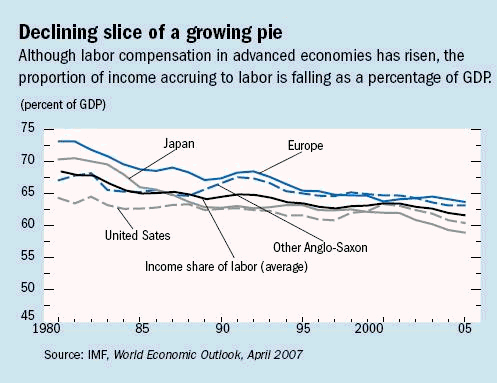
Typical street scene in Santa Ana, El Salvador. (Photo: iStock)
IMF Survey: Labor Globalization: Bane or Boon?
April 11, 2007
- Labor globalization has benefited advanced economies
- Growth in real labor compensation has been sluggish in unskilled sectors
- Advanced economies must be aware of adjustment costs
Over the past two decades, labor has become increasingly globalized.

Job training in Hamburg, Germany: advanced economies should increase access to education and training (photo: ZUMA Press)
WORLD ECONOMIC OUTLOOK
Chapter 5 of the IMF's April 2007 World Economic Outlook (WEO) estimates that the integration of China, India, and the former Eastern bloc into the world economy, together with population growth, has quadrupled the size of the effective global labor force since 1980. It could more than double again by 2050. Advanced countries can access this increased labor pool through imports of final products, the offshoring of intermediate production (offshore outsourcing), and immigration. Interestingly, although offshore outsourcing has received considerable attention in recent years, it is still small in relation to the overall economy.
Highlights
The issue: Is globalization forcing down labor income in advanced economies?
The bottom line: Although the global labor force has swelled over the past two decades, it has contributed to rising labor compensation in advanced economies.
Is there a downside? Yes. Globalization is one of several factors that have reduced the share of income accruing to labor in advanced economies.
The globalization of labor has benefited advanced economies: it has expanded export opportunities considerably and, by lowering input costs and improving production efficiencies, has boosted productivity and output. As a result, overall workers' wages in all advanced countries have risen since 1980. Calculations suggest that the decline in traded goods prices over the past 25 years has generated a 6 percent increase in both output and real labor compensation, on average, in advanced economies.
Technological advances
Research published in the WEO suggests that labor globalization, technological change, and labor market policies have all affected the share of income accruing to labor (the labor share) over the past two decades (see chart). The first two have reduced the proportion of income going to labor, with technological advances having the larger effect. This share has declined by about 7 percentage points, on average, since the early 1980s in advanced countries, with the European countries, Japan, and unskilled sectors of the economy experiencing the largest declines. In contrast, the WEO finds that countries that have reduced the tax wedge to enable workers to take home a larger proportion of their gross pay and ensured that unemployment benefits replacement rates do not deter workers from seeking employment have generally experienced a smaller decline in labor share.

But, although the labor share has declined, the globalization of labor—as manifested in cheaper imports in advanced economies—has increased the size of the pie to be shared among all citizens, resulting in a net gain to total workers' compensation in real terms.
Technological change has had a particularly important negative effect on the labor share in unskilled sectors, and growth in real labor compensation in unskilled sectors has hence been sluggish. In the United States, unskilled employment has held steady, but the earnings gap between skilled and unskilled sectors has widened by 25 percent. In Europe, real compensation per worker in both skilled and unskilled sectors grew broadly in line, but employment in unskilled sectors lost ground to employment in skilled sectors.
Challenges for policymakers
The increasing globalization of labor raises important challenges for policymakers in the advanced economies. They must seek to harness the benefits that the growing pool of global labor is creating. This means continuing to liberalize trade while ensuring that domestic economies are flexible enough to adjust and respond to the pressures of globalization. At the same time, they must be aware of adjustment costs and implement policies that support those people negatively affected by labor market globalization. In broad terms, policies should meet three objectives:
• Improve the functioning of labor markets. Policies that reduce labor costs to business (specifically, that lower the tax wedge) and increase the ease with which workers move from declining to expanding areas of the economy will help the adjustment. In some countries, making health care less dependent on continued employment and increasing the portability of pension benefits would also help.
• Increase access to education and training. Workers in skilled sectors have been better able to adapt to changing conditions caused by the revolution in information and communications technology than workers in unskilled sectors. Improved education and training will help workers compete with the growing pool of skilled workers in emerging market countries, especially in Asia.
• Ensure adequate safety nets. Adequate income support should be available to cushion, but not obstruct, the process of change.


